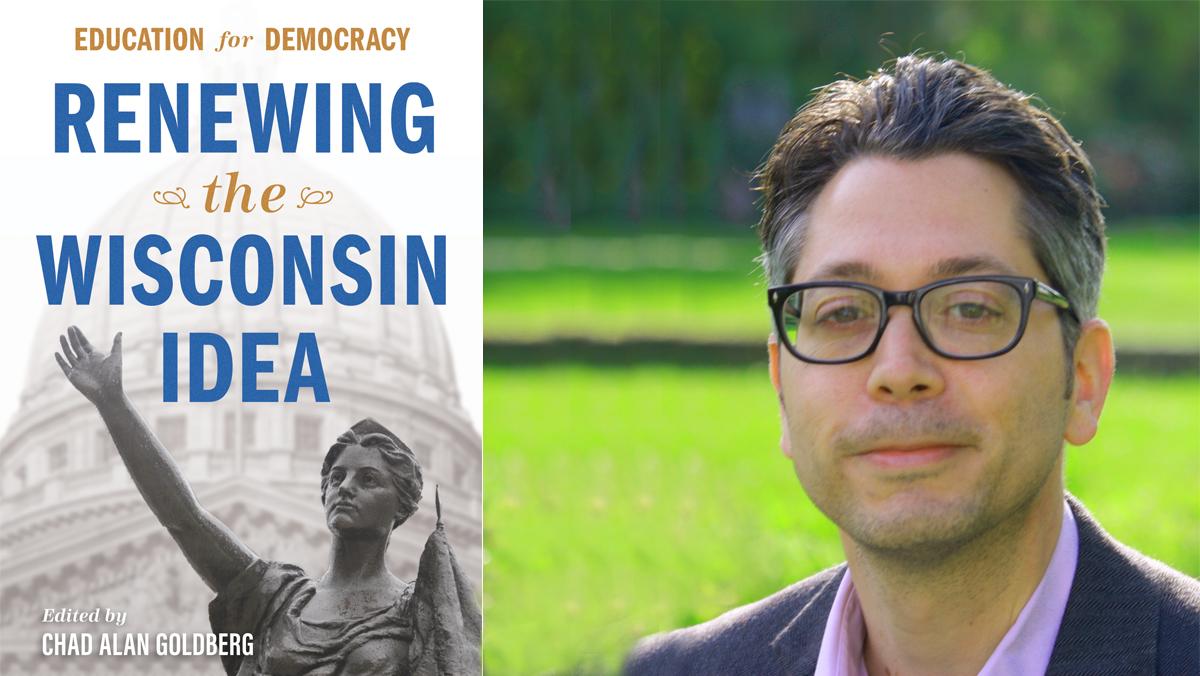Few things have shaped our state more than the Wisconsin Idea, a more-than-century-old commitment of the University of Wisconsin to serve the state’s citizens. To this day, the fingerprints of the Wisconsin Idea are clearly visible on Wisconsin’s education, economy, politics, culture, and environment. Despite this, many still wonder, “What the heck is the Wisconsin Idea?”
A new title from the University of Wisconsin Press, Education for Democracy: Renewing the Wisconsin Idea, seeks to answer to this question through a series of essays written by contemporary practitioners of the Wisconsin Idea. Edited by UW–Madison sociology professor Chad Alan Goldberg, the volume features essays by standout presenters from a course and public lecture series developed by Goldberg’s former Department of Sociology colleague Patrick Brenzel, “Forward? The Wisconsin Idea, Past & Present.”
Goldberg begins with an exploration of the origins and evolution of the Idea, providing a clear definition: The Wisconsin Idea “refers to the historic mission of the University of Wisconsin to serve democracy, in part by sharing expert knowledge with state government to inform and improve public policy, and in part by research and outreach activities to enrich the lives and promote the well-being of the people, all of which requires a robust commitment to academic freedom.” At its core, Goldberg argues, the Idea is the belief that education and collaboration are the keys to a vibrant democracy that benefits all citizens, rather than just a privileged few.
Subsequent essays by Brenzel and Idea proponents such as Jane L. Collins, Lewis A. Friedman, Caitlin Cieslik-Miskimen, and R. Richard Wagner add more color and texture to Goldberg’s argument. Conservation biologist Curt Meine’s essay on the state’s conservation legacy showcases the way Idea advocates, such as Aldo Leopold and Senator Gaylord Nelson, worked alongside citizens to conserve our shared natural resources. Here we see the Wisconsin Idea inspiring a democratic collaboration in service of the public good. Likewise, human ecology researcher Karen Bogenschneider shares an essay that traces how ideas “sifted and winnowed” at the university informed effective state policy over many years. She warns, however, that increasing political polarization has jeopardized this working relationship.
Historian J. David Hoeveler contributes an essay on John Bascom, an early and influential president of the University of Wisconsin, and his contribution to the moral and intellectual underpinnings of the Idea. Hoeveler illustrates the way some politicians and university administrators over the years have sought to redefine the Idea—to the detriment of the UW System as well as Wisconsin residents. In Katherine J. Cramer’s essay, we see how these blows against the Idea culminated in an attempt by the Walker Administration to replace the UW System’s stated mission, to “improve the human condition,” with a brutish mandate to “bolster the economy.”
Readers of Goldberg’s collection might come away convinced that the Wisconsin Idea is as imperiled as the democracy it seeks to improve. However, in addition to highlighting the accomplishments of influential proponents, Education for Democracy envisions a Wisconsin Idea that reaches out to historically ignored citizens such as women, Native and African Americans, LGBT communities, and those on the economic fringe. This forward-looking Idea is exemplified in Emily Auerbach’s Odyssey Project, which she describes as “a free, two-semester, six-credit humanities course designed to empower adults at the poverty level to overcome adversity and achieve dreams through higher education.”
Like so many cultural ideals, the vitality of the Wisconsin Idea is inexorably tied to our belief in it. Long-time arts administrator, Maryo Gard Ewell, captures the past and future energy of the Wisconsin Idea by concluding her essay with a poem by her father, the indefatigable arts advocate and educator Robert Gard:
That here, in our place
We are contributing to the maturity
Of a great nation.
If you try, you can indeed
Alter the face and the heart
Of America.




